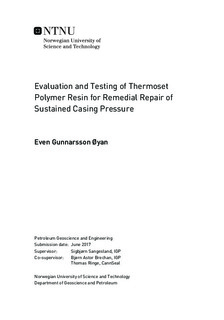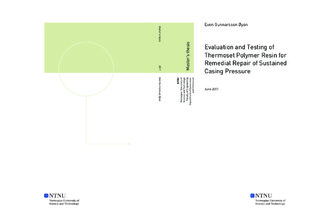| dc.description.abstract | The number of petroleum wells exhibiting pressure build-up in the annulus as a result of lost cement integrity is evident, this is known as Sustained Casing Pressure (SCP). There are several factors contributing to lost integrity, among them are a poor primary cementing operation and casing expansion resulting in cement sheath failure due to alternations in pressure and temperature. Fluid migration (mainly gas) can happen over the cemented column over the entire life-cycle of a well, the remedial methods available for mitigation or minimizing of this migration requires a large workover intervention where cement is used as the sealing material. Cement does present in many cases a challenge to successfully achieve a long-term integrity due to its brittleness, limited strength, low flexibility and poor shear bond properties. The need for alternative plugging materials and placement methods are therefore apparent. One possible alternative is a thermosetting polymer based system, which gives a higher tensile and compressive strength, more flexible and a higher adhesion to other materials.
This thesis will focus on remedial treatment of a typical SCP application, hence cement is present in the annulus. The placement method focused on is the electric wireline conveyed CannSeal tool provided by a Norwegian technology company. The tool perforates the casing and injects a sealant into the annulus. The tool and method have been run for different operator companies for sealing an open annulus (no cement present) in relations to Enhanced Oil Recovery (EOR) operations. Presented and discussed in this thesis is a test project where four large-scale annulus tests cells filled with cement was built, then leak tested as an SCP application. After the leak rate was established, the CannSeal tool was fed into the cell, made a communication to the cement sheet by perforating and then injected a sealant resin (epoxy) into the cemented annulus. The conclusion for the results was that using the CannSeal technology and injecting a resin sealant into the cemented annulus significantly reduced the gas leak. On all four cells the measured average gas breakthrough differential pressures including all cells were 25 bar prior to injection, and 130 bar after injection and curing of the resin.
Because of the positive results achieved in this project, the concept of remedial repair of SCP with injecting a resin will be field trialed at the Shell test center in Rijswijk summer 2017. | |

